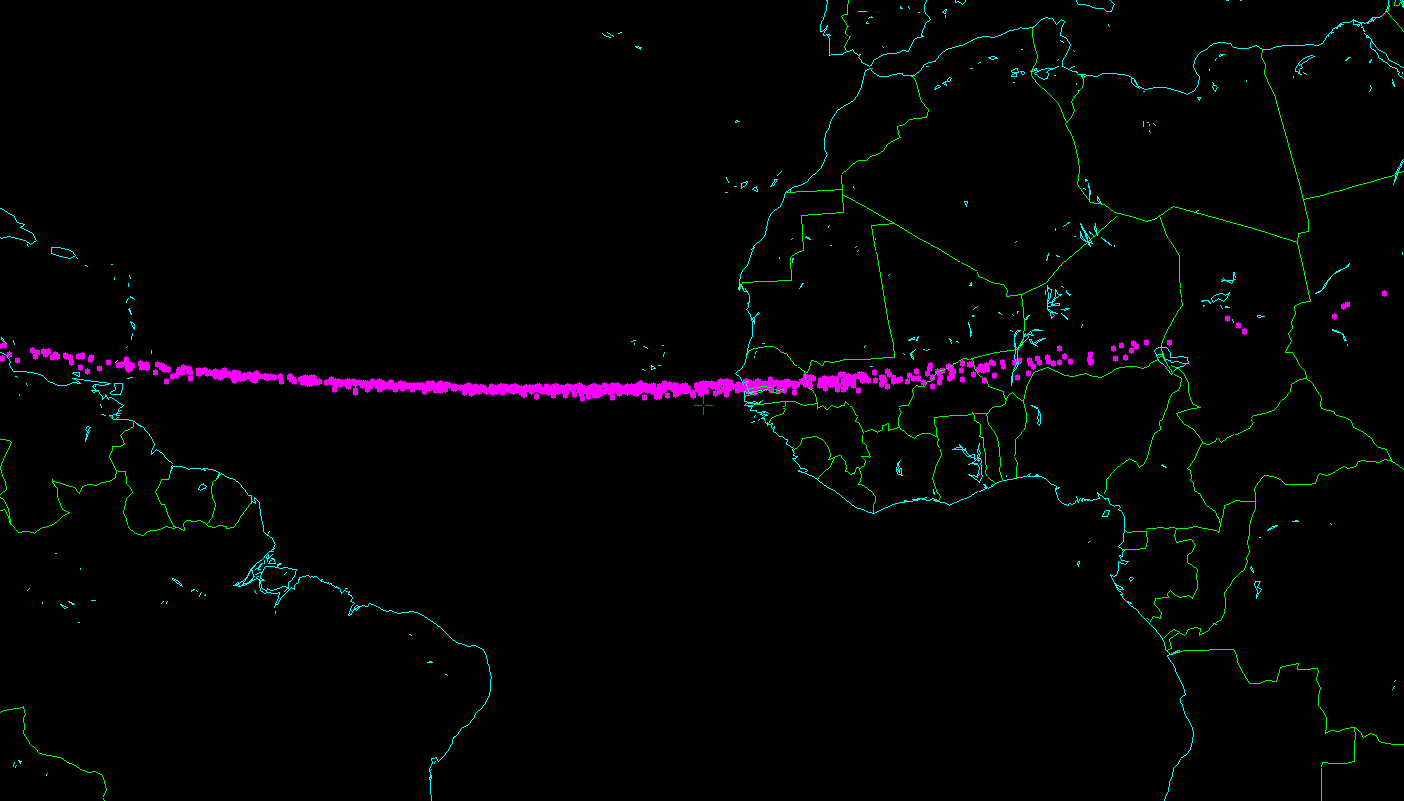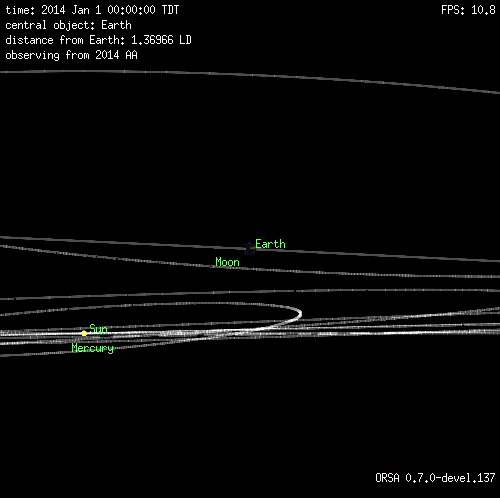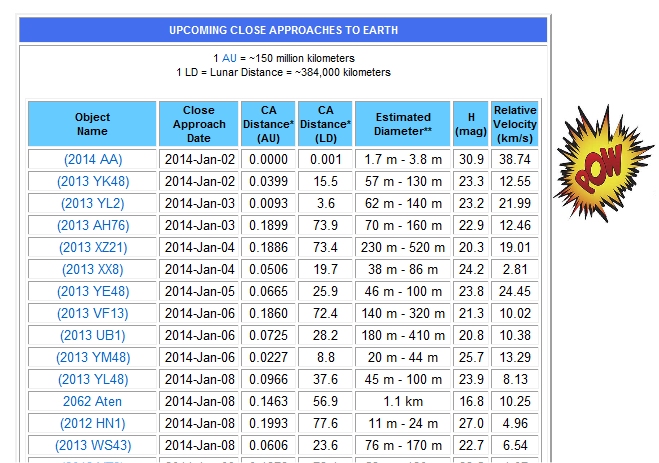It looks like you're using an Ad Blocker.
Please white-list or disable AboveTopSecret.com in your ad-blocking tool.
Thank you.
Some features of ATS will be disabled while you continue to use an ad-blocker.
share:
My Facebook feeds from astronomy groups and pages have exploded with the news: a tiny and recently discovered asteroid 2014 AA (approx 4 meters in
diameter) has exploded in the Earth's atmosphere, somewhere off the coast of West Africa. It would have produced an air-burst comparable to a small
nuclear bomb, similar to the 2008 TC3 asteroid that exploded over Africa.
remanzacco.blogspot.it...


Wiki article: en.wikipedia.org...
I will post more updates soon, as they are coming.
P.S. Here are impact simulation results, using the same impact velocity and angle as 2008 TC3: Click
It's an air-burst, but some fragments may make their way to the surface (in this case, most probably the Atlantic ocean). Air-burst energy = 0.5 kilotons.
remanzacco.blogspot.it...
It is virtually certain that 2014 AA hit the Earth's atmosphere on 2014 Jan. 2.2 +/- 0.4, as demonstrated by independent calculations by Bill Gray, the MPC and Steve Chesley (JPL). According to Chesley, the impact locations are widely distributed, most likely falling on an arc extending from Central America to East Africa, with a best-fit location just off the coast of West Africa on Jan. 2.10. 2014 AA was unlikely to have survived atmospheric entry intact, as it was comparable in size to 2008 TC3, the only other example of an impacting object observed prior to atmospheric entry.
Below you can see the two maps of the possible impact region made by Bill Gray.


Wiki article: en.wikipedia.org...
I will post more updates soon, as they are coming.
P.S. Here are impact simulation results, using the same impact velocity and angle as 2008 TC3: Click
It's an air-burst, but some fragments may make their way to the surface (in this case, most probably the Atlantic ocean). Air-burst energy = 0.5 kilotons.
edit on 2-1-2014 by wildespace because: (no reason given)
reply to post by wildespace
Yes, sooner or later one of these things may fall in a major city and we can`t do anything about it
Yes, sooner or later one of these things may fall in a major city and we can`t do anything about it
CosmicDude
reply to post by wildespace
Yes, sooner or later one of these things may fall in a major city and we can`t do anything about it
Sure there is. We'd start a recovery effort and then begin rebuilding.
That's what we always do, even if it makes no sense to do so, like New Orleans.
reply to post by TDawgRex
LOL!!!!
Rebuild a slum. Like Detroit. LOL.
(Uh oh.......)
LOL!!!!
Rebuild a slum. Like Detroit. LOL.
(Uh oh.......)
edit on 2-1-2014 by justreleased because: (no reason given)
reply to post by wildespace
Here's an animation from your link.

Almost looked like it was guided. Yeah, sorry, couldn't resist
Am I reading it wrong, or was this asteroid the first one being detected in 2014?
Here's an animation from your link.

Almost looked like it was guided. Yeah, sorry, couldn't resist
Am I reading it wrong, or was this asteroid the first one being detected in 2014?
Wonder if it fragments from Ison debris? Any Astromoners can confrim or deny this?
Be intresting to see if there are a few more little instances over the next couple of months. Hopeffully if so they will be contained to uninhabited areas.
Be intresting to see if there are a few more little instances over the next couple of months. Hopeffully if so they will be contained to uninhabited areas.
I'm in that pink line (Aruba). I didn't hear or notice anything last night.
I wonder if it has anything to do with this thread:
Asteroid to Hit Atlantic says Russia
The trajectory, in scientific terms, is astronomically close...
Asteroid to Hit Atlantic says Russia
The trajectory, in scientific terms, is astronomically close...
phantomjack
I wonder if it has anything to do with this thread:
Asteroid to Hit Atlantic says Russia
The trajectory, in scientific terms, is astronomically close...
I'm pretty sure we'll have one of our Puerto Rican members pop in sooner or later to say "Nawp, still here, bro."
Still pretty interesting though, I wonder if any coast folks or fishermen got a good show?
reply to post by skyblueworld
Yeah, from your chart, people should be watching the sky's tonight/tomorrow as well, since that one is a bit bigger.
Would be interesting to hear in the next day if anyone found any fragments from this one OP.
I'm way to far north to have seen anything of it in the sky though.
Yeah, from your chart, people should be watching the sky's tonight/tomorrow as well, since that one is a bit bigger.
Would be interesting to hear in the next day if anyone found any fragments from this one OP.
I'm way to far north to have seen anything of it in the sky though.
More and more when I check Space Weather each morning am I seeing previously unknown objects listed that have
already passed us at very close distances. (under a LD)
As well as updated with new ones, so as a previous poster said only a matter of time and will be without warning most likely, so untold will be the consequences. I just for one hope they keep staying small and landing in water with only a light show, because I for one do not even want to fathom the aftermath, if it were to hit land
SaneThinking
As well as updated with new ones, so as a previous poster said only a matter of time and will be without warning most likely, so untold will be the consequences. I just for one hope they keep staying small and landing in water with only a light show, because I for one do not even want to fathom the aftermath, if it were to hit land
SaneThinking
crazyewok
Wonder if it fragments from Ison debris? Any Astromoners can confrim or deny this?
No, its orbit was nothing like ISON's, not even close.
ssd.jpl.nasa.gov...
Can we please stop with the "ISON debris threat" silliness already?
crazyewok
Wonder if it fragments from Ison debris? Any Astromoners can confrim or deny this?
Be intresting to see if there are a few more little instances over the next couple of months. Hopeffully if so they will be contained to uninhabited areas.
ISON at its closest was 40 million miles from Earth; that is nowhere near Earth. In fact, Venus is closer to Earth right now (about 30 Million miles) than ISON ever was.
Even after ISON broke up, its momentum would have kept all of the debris close to ISON, moving along the same general orbit as the intact ISON originally was moving (i.e., nowhere near earth).
edit on 1/2/2014 by Soylent Green Is People because: (no reason given)
Nyiah
phantomjack
I wonder if it has anything to do with this thread:
Asteroid to Hit Atlantic says Russia
The trajectory, in scientific terms, is astronomically close...
I'm pretty sure we'll have one of our Puerto Rican members pop in sooner or later to say "Nawp, still here, bro."
Still pretty interesting though, I wonder if any coast folks or fishermen got a good show?
No, what I am saying is that everyone laughed at the Russian prediction, yet, almost on cue, an asteroid, albeit, much smaller and not devastating enters earth's atmo at nearly the same trajectory that was predicted, albeit, a little east of the original prediction.
Could the Russian military people who made this statement last week be talking about this particular event, though, not as devastating as originally thought?
If you look at the illustration, the asteroid sailed about 100 miles south of Puerto Rico on its way to the African continent.
crazyewok
Wonder if it fragments from Ison debris? Any Astromoners can confrim or deny this?
Be intresting to see if there are a few more little instances over the next couple of months. Hopeffully if so they will be contained to uninhabited areas.
NO.
ISON was on a totally different trajectory.
reply to post by Soylent Green Is People
I only asked as we were meant to have been traverliing through its debri trail if it hadnt of broken up.
I only asked as we were meant to have been traverliing through its debri trail if it hadnt of broken up.
new topics
-
Man Stabbed or Cardiac arrest on Westminster Bridge, London, UK
Mainstream News: 44 minutes ago -
A fix for the Trans players in sports
Social Issues and Civil Unrest: 2 hours ago -
Petition Calling for General Election at 564,016 and rising Fast
Political Issues: 5 hours ago -
Rep. Alexandria O. Cortez Says Forcing People to Use The Correct Bathroom is Dangerous.
US Political Madness: 11 hours ago
top topics
-
Petition Calling for General Election at 564,016 and rising Fast
Political Issues: 5 hours ago, 11 flags -
France gives Ukraine license to fire long-range missiles at Russia
World War Three: 16 hours ago, 9 flags -
Rep. Alexandria O. Cortez Says Forcing People to Use The Correct Bathroom is Dangerous.
US Political Madness: 11 hours ago, 7 flags -
Ok this is some BS now WTH
Rant: 14 hours ago, 5 flags -
A fix for the Trans players in sports
Social Issues and Civil Unrest: 2 hours ago, 5 flags -
Cooperation zones
World War Three: 13 hours ago, 4 flags -
Man Stabbed or Cardiac arrest on Westminster Bridge, London, UK
Mainstream News: 44 minutes ago, 0 flags
active topics
-
Cooperation zones
World War Three • 16 • : KnowItAllKnowNothin -
Man Stabbed or Cardiac arrest on Westminster Bridge, London, UK
Mainstream News • 1 • : theatreboy -
France gives Ukraine license to fire long-range missiles at Russia
World War Three • 28 • : Imhere -
Results of the use of the Oreshnik missile system in Dnepropetrovsk
World War Three • 185 • : bastion -
Petition Calling for General Election at 564,016 and rising Fast
Political Issues • 30 • : Cymru -
International Criminal Court Issues Arrest Warrant For Netanyahu
Mainstream News • 46 • : JJproductions -
-@TH3WH17ERABB17- -Q- ---TIME TO SHOW THE WORLD--- -Part- --44--
Dissecting Disinformation • 3367 • : Thoughtful3 -
Rep. Alexandria O. Cortez Says Forcing People to Use The Correct Bathroom is Dangerous.
US Political Madness • 28 • : WeMustCare -
Ok this is some BS now WTH
Rant • 10 • : awhispersecho -
A fix for the Trans players in sports
Social Issues and Civil Unrest • 9 • : Xtrozero


